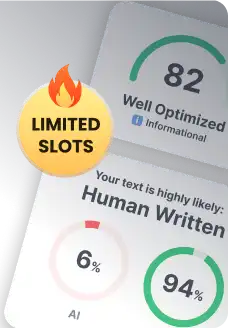Why does plagiarism still rear its ugly head with all the creativity that exists in our world? Writers who steal work face big trouble—lawsuits, personal ruin, shredded integrity. But it’s not just the writers who are harmed. Readers lose faith in content, wondering if it’s true. Schools and the research community take a hit too, with their reputations on the line and research integrity crumbling. Let’s break down why plagiarism is a complete no-go zone and makes an ugly mess for everyone in its path. Plagiarism repercussions are severe and far-reaching. Plunge in and stay authentic to originality.
Key Takeaways
- Plagiarism is taking someone else’s work, ideas, or expression as your own. Such deceitful behavior can severely undermine academic integrity and trust among scholars.
- Academic consequences include failing grades, suspension, or expulsion, affecting a student’s academic record and prospects.
- Plagiarism can ruin the reputations of authors and professionals. It results in a loss of credibility, career consequences, and possibly even getting fired.
- Plagiarism destroys innovation and creativity. This dishonesty creates a culture of no trust and pours cold water into the distribution of actual wisdom.
- When plagiarism runs rampant among students or faculty members, educational institutions suffer reputational damage. This results in less trust and a risk of loss of accreditation.
- Plagiarism can also have serious legal implications, such as lawsuits, fines, or penalties. Ethical standards demand that all scholarly and professional work be accountable.
What Is Plagiarism?
Definition of Plagiarism
Plagiarism is the act of taking someone else’s work or ideas and failing to give them credit. This includes replicating their words, concepts, or even the format of their writing. It’s not just about copying sentences or paragraphs; it can also involve borrowing significant ideas or phrases.
Sometimes, people omit the source unintentionally. They might make slight adjustments to someone else’s work without realizing they are plagiarizing. This unintentional plagiarism can occur easily, demonstrating the necessity of understanding what constitutes plagiarism to maintain academic honesty.
When submitting work, ensure it is original, or cite the source of your information. Self-plagiarism, turning in the same work for multiple assignments without permission, is also a serious issue and a violation of academic integrity.
Every submission should demonstrate new effort and insights. Understanding plagiarism is crucial because it upholds the trust upon which all academic endeavors are built.
Types of Plagiarism
Plagiarism takes various forms. Direct copying is the most obvious, but there are others, like mosaic plagiarism, which involves taking phrases or ideas from multiple sources and combining them into a new whole without proper attribution.
Paraphrasing without citation is another form, where someone rewords another’s ideas but doesn’t cite the source. Translated plagiarism occurs when someone rephrases a work in another language without crediting the original author.
Each type of plagiarism has consequences. For instance, directly plagiarizing work could cause failing grades or expulsion from a university. Self-plagiarism can harm your academic reputation and cause others to distrust your work.
Mosaic plagiarism and paraphrasing without attribution can damage your reputation for originality and integrity. The academic system suffers if plagiarism is rampant.
Plagiarism harms not only the plagiarist but also the person whose work was copied. For the plagiarist, it can lead to a loss of confidence and a sense of dishonesty. For the original creator, it can damage their reputation and credibility.
Research indicates that 37% of people believe plagiarism by researchers harms the integrity of the academic system. Poor research often leads to plagiarism, resulting in unoriginal and uncreative work.
Academic Consequences of Plagiarism
1. Failing Grades and Rejected Work
When plagiarism is detected in academic work, the first consequence is often a failing grade. Instructors have various options when dealing with plagiarism, but a typical response is to fail the plagiarized assignment or even the entire course. This directly impacts your GPA, making it harder to achieve your academic goals.
If a student submits an essay that lacks academic integrity, it is usually rejected, a common outcome in academic settings. Such rejections mean the effort is wasted, and the student must start over, wasting valuable time. This process ensures academic integrity and everyone follows the same rules.
2. Disciplinary Actions in Schools
The plagiarism response extends beyond grades. Schools may impose disciplinary actions, including probation or expulsion, particularly for repeated violations. Most first-time offenses could cause disciplinary probation, a significant academic demerit. A second offense could lead to harsher punishments, such as suspension or dismissal from the university.
Academic integrity committees play a crucial role in thoroughly investigating cases to ensure fair treatment. These committees enforce policies rigorously, using plagiarism checkers that scan work against millions of texts to detect similarities.
3. Damage to Academic Reputation
Beyond immediate penalties, plagiarism can have lasting effects on your reputation. Allegations of plagiarism can tarnish your image, affecting how both peers and professors perceive you. This mark can impact your subsequent academic and career trajectory.
Imagine trying to secure a job or gain admission to graduate school with a tarnished history. Employers and admissions committees value integrity and may hesitate to hire or admit someone with a record of academic dishonesty. Maintaining a clean academic record is crucial for establishing trust and demonstrating your commitment to ethical practices.
4. Expulsion from Institutions
In extreme cases, plagiarism can cause expulsion, abruptly ending your tenure at a school. Colleges evaluate offenses using specific criteria and repeated or blatant plagiarism can lead to expulsion. The effect is profound and long-lasting. Expulsion means starting over, often with a difficult-to-erase stain on your record.
It serves as a stark reminder of the importance of original work. Outside of academia, penalties for copyright infringement can include substantial fines or even jail time, underscoring that the fallout from plagiarism extends beyond school.
Professional Repercussions for Authors
Want to try SurgeGraph for free?

Generate 20 documents

SEO tools (Auto Optimizer, Internal Linking, and more)

No credit card required
Impact on Author’s Credibility
Plagiarism leaves a lasting scar on an author’s credibility. Accusations taint every past and future project. Imagine a reader picking up your book or article and questioning its originality. This doubt can be devastating. Once shattered, trust is hard to rebuild.
Readers may become skeptical, and peers might be reluctant to collaborate. Restoring trust requires sustained effort and time. Originality is the foundation of professional integrity, so authors must ensure their work represents their unique voices and ideas.
Legal and Financial Penalties
Legal repercussions of plagiarism involve complex processes. The mere thought of lawsuits should deter any author. Copyright infringement can lead to hefty financial penalties, draining resources, and tarnishing an author’s standing.
Imagine being entangled in a legal web, defending your reputation and livelihood. Severe cases even risk imprisonment, a daunting prospect that underscores the seriousness of plagiarism. It’s not just about crediting co-authors or avoiding dual submissions to journals.
It’s about respecting intellectual property. The US Department of Health and Human Services Office of Research Integrity defines plagiarism as theft. This perspective highlights the gravity of the offense and the potential legal battles one might face.
Loss of Reader Trust
Reader trust forms the backbone of an author’s success. Plagiarism erodes this trust, creating a rift that can widen over time. Readers, once confident in your authenticity, may feel betrayed.
This loss extends beyond individual works, impacting your audience’s loyalty and overall marketability. Transparency and authenticity become crucial in writing. Readers value honesty and originality, and when these are compromised, the repercussions ripple across your career.
Consider the importance of maintaining a transparent relationship with your audience. In an era where information spreads rapidly, authenticity can set you apart, fostering a loyal readership that trusts your words.
Broader Effects on Society
Influence on Political Figures
In politics, plagiarism can dismantle the fabric of public trust. Politicians have often faced accusations of using speeches or writings without proper credit. Such scandals can dramatically shift public opinion.
People demand honesty and integrity from their leaders, and when those expectations are broken, disappointment and cynicism quickly set in. The public’s response to plagiarism accusations is usually immediate and severe.
A media frenzy ensues, with intense debate about the ethics involved. This scenario can harm the individual’s credibility and tarnish the reputation of the political institution they represent. These incidents have ripple effects that extend beyond the immediate fallout, contributing to a general sense of distrust toward government actions.
Challenges in Scientific Research
Plagiarism undermines the integrity of scientific work. Imagine a study making headlines for a breakthrough, only to be revealed as plagiarized. The consequences can be severe, leading to the retraction of published studies and undermining the credibility of the scientific community.
When a research paper is retracted for plagiarism, it triggers a chain reaction, affecting other studies that cited it. The implications for public health and safety are significant. Dishonest research practices can mislead the public and policymakers, leading to misguided decisions that might undermine health efforts.
This underscores the necessity for truthfulness and originality in scientific endeavors. Without these, the foundation of research is at risk, jeopardizing progress and innovation.
Impact on Published Content Integrity
The integrity of published content suffers when plagiarism occurs. It undermines the credibility of the pieces readers rely on for accurate information. When material is unoriginal, it becomes less valuable to those seeking insight.
For instance, a plagiarized article or book may spread misinformation, creating confusion and mistrust among readers. Originality is the backbone of academic publications, ensuring that new ideas and perspectives advance knowledge.
The peer review process serves as a crucial safeguard against plagiarism. By examining submissions for authenticity, peer reviewers help maintain the reliability of scholarly works. This system is essential for ensuring the quality of academic literature and that readers can trust what they read.
Consequences for Educational Institutions
Effects on Institutional Reputation
When plagiarism surfaces in educational institutions, the repercussions can be profound. High-profile cases can tarnish an institution’s image, casting a shadow over its academic achievements. For instance, if a faculty member or prominent student is found guilty of plagiarism, the news can quickly spread through social media.
This often precedes formal investigations, which are lengthy and costly, involving lawyers and various inquiries. Such incidents may lead to significant reputational damage, impacting how the public perceives the institution’s commitment to academic integrity. The long-term effects of a dented reputation are dire, often impacting student enrollment.
Potential students may avoid institutions with scandals, concerned about their academic future and the value of their degrees. This decline in student interest leads to fewer applications, directly affecting the institution’s financial health and its ability to attract top talent.
Enforcing rigorous academic standards is essential for institutions to protect their reputation and maintain their position in the academic world.
Want to try SurgeGraph for free?

Generate 20 documents

SEO tools (Auto Optimizer, Internal Linking, and more)

No credit card required
Influence on Research Standards
Plagiarism not only tarnishes public image but also lowers research standards across an institution. If plagiarism is rampant, it questions the quality and originality of published work, potentially leading to decreased funding and support for research programs. Stakeholders may lose faith in the institution’s ability to produce credible work.
For example, funders might be wary of supporting research projects from an institution with a history of plagiarism. Encouraging a culture of integrity in academic research is crucial. By instilling values of honesty and originality, institutions can ensure their research remains credible.
This commitment to integrity safeguards the institution’s financial stability and enhances its reputation as a leader in innovative and trustworthy research.
Role in Upholding Academic Honesty
Educational institutions play a vital role in fostering academic integrity. They must create a learning environment where integrity is taught and modeled. This starts with clear policies on plagiarism, including the repercussions for violations.
Many schools, for instance, suspend students for a first offense, and a second may cause dismissal. Such stringent policies are necessary to safeguard the institution’s integrity. Educating students about plagiarism prevention is equally important.
Institutions should offer resources and training sessions on the consequences of plagiarism and how to avoid it. This cultivates a culture of integrity, where students understand the importance of original work and the consequences of dishonesty.
Legal and Ethical Implications
Navigating the complex world of plagiarism involves understanding both legal and ethical dimensions. Let’s delve into the details of each.
Legal Ramifications of Plagiarism
Plagiarism isn’t just an ethical lapse; it’s a legal minefield. Under copyright laws, authors own the rights to their original creations. Copying work without permission violates these rights. Legal actions can range from heavy fines to lawsuits.
In extreme cases, courts have ordered plagiarists to pay thousands in damages. This financial blow can be especially harsh for those in early careers. Familiarizing yourself with copyright law is crucial. Understanding the difference between fair use and infringement can help you avoid costly mistakes.
A few lines from a book with proper credit can be fair use while copying full pages is not. On a personal level, this knowledge protects your career from legal liability. Professionally, it safeguards your reputation in a field where trust is paramount.
Ethical Considerations in Content Creation
Ethical writing practices are the backbone of integrity in content creation. It’s about more than just following rules; it’s about respecting the work and effort that goes into creating original content. Proper citation and acknowledgment play a significant role.
When you give credit where it’s due, you show respect for the original creator’s intellectual property. This isn’t just a formality; it’s a commitment to honesty. For example, in a research paper, citing sources correctly not only supports your arguments but also builds your credibility as a writer.
Moreover, committing to originality means pushing yourself to produce unique insights and ideas. Imagine being recognized for your contributions rather than someone else’s. This builds a legacy of trust and respect in any professional field.
Frequently Asked Questions
What is plagiarism?
Plagiarism is copying someone else’s work without permission or giving credit. It’s taking text, ideas, or images, and claiming that work as your own. This is unethical and can have serious consequences.
What are the broader effects of plagiarism on society?
Plagiarism erodes trust in news sources. It stifles innovation and creativity and can contribute to misinformation. Society relies on genuine and original content for advancement.
How does plagiarism affect educational institutions?
Institutions risk losing their reputation and accreditations. They will also be cut from funding and partnerships. It is for their credibility and success that they maintain academic integrity.
What are the legal implications of plagiarism?
Plagiarism can cause lawsuits and financial damages. Copyright laws protect original works, and violators can face hefty fines and even jail time.
Are there ethical implications for plagiarism?
Yes, plagiarism is unethical. It’s dishonest and disrespects other people’s work. It undermines personal integrity and the trust of peers and the public.





